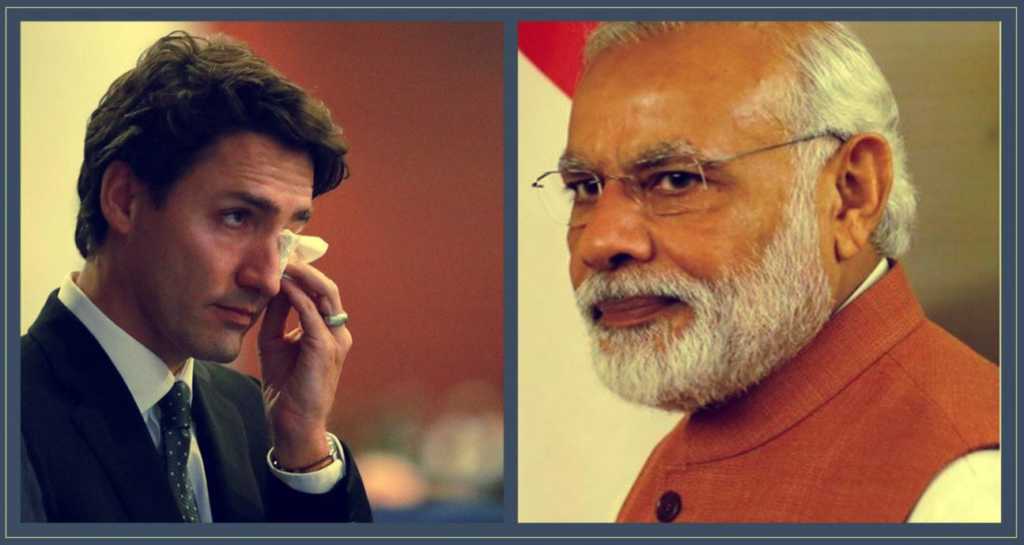Amidst the ongoing farmer protests in India, Canadian Prime Minister Justin Trudeau and Defense Minister Harjit Singh Sajjan have come out with distasteful comments on the situation. India has not taken too kindly to the unwarranted statements and has clearly and unequivocally stated exactly what it thinks about countries’ involvement in its internal affairs.
On 30th November, on the occasion of Guru Nanak Jayanti, Trudeau had said, “I would be remiss if I didn’t start by recognizing the news coming from India about the protest by farmers. The situation is concerning. We are all very worried about family and friends. I know that’s a reality for many of you. Let me remind you, Canada will always be there to defend the rights of peaceful protest.”
A day prior to that, Sajjan, who is known for his radical views and his alleged support to the Khalistani rebellion in 1980s, had come out in support of the protests to state, “The reports of peaceful protesters being brutalized in India are very troubling.” Continuing with his half baked knowledge, he said, “Healthy democracies allow peaceful protest. I urge those involved to uphold this fundamental right.”
The reports of peaceful protesters being brutalized in India are very troubling. Many of my constituents have family there and are worried about the safety of their loved ones. Healthy democracies allow peaceful protest. I urge those involved to uphold this fundamental right. https://t.co/myWev8t3uW
— Harjit Sajjan (@HarjitSajjan) November 28, 2020
Even Canadian leaders Erin Michael O’Toole, Jagmeet Singh and Jack Harris have offered support to farmers’ protests.
India reacted to these unwanted intrusion like any democracy would. In response to this, the Canadian High Commissioner was summoned to the Ministry of External Affairs on 4th December and informed these comments on “issues relating to Indian farmers constitute an unacceptable interference” in India’s“internal affairs.”
The statement further added, “Such actions, if continued, would have a seriously damaging impact on ties between India and Canada.”
It may be pertinent to note that these protests are not just peaceful protests organised in a democracy but have an underlying Khalistani element to them. From threatening Prime Minister Modi by reminding him about Indira Gandhi’s assassination to carrying posters of separatist Sant Jarnail Singh Bhindranwale and hoisting ’Khalistan’ flags in Delhi, the whole protest is fraught with Khalistani agenda.
With the anti-government movement quickly becoming an anti-national one, unwarranted comments by the Canadian cabinet does not bode well for diplomatic relations between the two countries. Even the Indian Government has re-iterated this in the demarche made to the Canadian High Commissioner, which said, “These comments have encouraged gatherings of extremist activities in front of our High Commission and Consulates in Canada that raise issues of safety and security. We expect the Canadian Government to ensure the fullest security of Indian diplomatic personnel and its political leaders to refrain from pronouncements that legitimize extremist activism.”
Immediately after Trudeau’s remark, MEA spokesperson Anurag Srivastava had also said, “We have seen some ill-informed comments by Canadian leaders relating to farmers in India. Such comments are unwarranted, especially when pertaining to the internal affairs of a democratic country.”
These same thoughts were echoed by leaders all across the political spectrum. Shiv Sena leader, Priyanka Chaturvedi reacting to Trudeau’s statement, tweeted, “India’s internal issue is not fodder for another nation’s politics.Please respect the courtesies that we always extend to other nations.”
It is worth noting that India has always reacted strongly to other nations’ interfering in its internal affairs. Last year, former Malaysian PM Mahathir had spoken against India’s decision to repeal Article 370 and then again on the Citizenship Amendment Act. In response to this, India had stopped importing palm oil from Malaysia. Since Malaysian economy depended heavily on its palm oil exports to India, the punitive restriction was detrimental to them. The bilateral relations only improved under the the new Muhyiddin government after they pulled out all stops to placate India.
Similarly, India has shown the same level of distaste to Justin Trudeau. The Canadian PM’s distasteful remarks are nothing but an attempt to appease the Sikh minority, which is a core vote base. However, in doing so, Trudeau has quite possibly disturbed the smooth bilateral relations between the two nations. By these comments, the PM of Canada and his cabinet are, in the best case scenario, showing their ignorance and in the worst case, encouraging the Khalistani movement.
